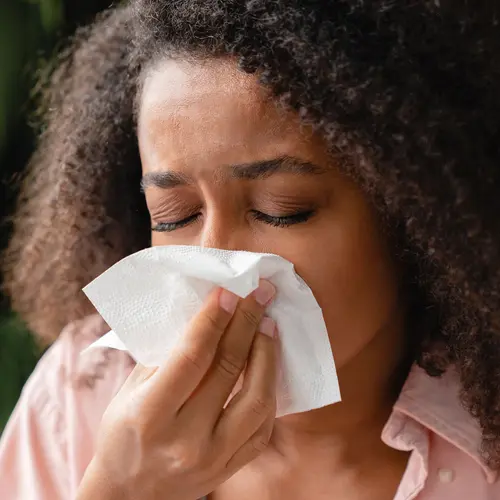Relief for allergies at school and day care is an urgent problem for many parents and kids.
Consider the statistics: As many as 40% of children in the U.S. suffer from seasonal allergies, and one in every 17 children under the age of 3 has a food allergy.
How can you work with teachers, coaches, the school nurse -- and your family -- to keep allergies at school under control? How can you help your child avoid missing important class days and be comfortable and productive while in school?
If your child's allergies are moderate to severe, you'll probably need to talk to the doctor about medication. But taking control of environmental and lifestyle triggers can also help your child by limiting exposure to allergens.
Talk to Teachers About Your Child's Allergies
It's important to educate your child's teachers and other school professionals about the specific allergies. Every child's situation is different, so try to schedule a parent-teacher conference prior to each new school year. Even if your child will be in the same school, allergy information will not necessarily be passed on to new teachers. Here are things you can do:
- Provide background resources they may need, such as the Asthma and Allergy tool Kit for School Nurses at https://www.aaaai.org/members/allied_health/tool_kit/. The American Academy of Allergy, Asthma, and Immunology also has fact sheets on allergic disorders. And you can get school guidelines for food allergies from the Food Allergy and Anaphylaxis Network at https://www.foodallergy.org/school.html.
- Bring a detailed list of your child's allergy triggers. The American Academy of Allergy, Asthma and Immunology offers a list to make sure you don't leave something out. (https://www.aaaai.org/media/resources/media_kit/triggers.stm)
- Discuss the ways in which your child might describe having an allergic reaction to something, since children can't always explain their symptoms in standard ways. "For example, instead of saying 'My tongue is swelling,' a 4-year-old might say that his tongue is hot, or feels hairy, or tastes funny," says Michael Pistiner, MD, an allergist in West Nyack, N.Y.
- Ask what measures the school takes to reduce seasonal allergies. Things they can do include installing high-efficiency air filters, promptly repairing leaky pipes, keeping windows closed on high-pollen days, limiting carpeting in classrooms, and having grounds maintenance done on weekends or before or after the school day. "They can also try to limit outdoor activities on high-pollen days, and use mats instead of rugs for nap time," says Charles Lowe III, a pediatric asthma and allergy specialist in Pikeville, Ky.
- If your child is allergic to animal dander, ask that "classroom pets" such as hamsters and gerbils be avoided. "If your child is allergic to a more common pet like a cat or dog, the chances are good that he or she could cross-react to less common animals, like rodents," says James Sublett, MD, an allergist in Louisville, Ky.
- If your child has food allergies, ask your allergist to fill out a "Food Allergy Action Plan" (available at https://www.aaaai.org/patients/gallery/foodallergy.asp), and provide copies to the school nurse, teachers, and administrators.
- If your child's allergies are life-threatening, be sure the school has multiple doses of medication (such as epinephrine) on hand and a policy for quick use in an emergency.
Food allergies, in particular, can be life-threatening, so it is important to ask detailed questions about your school's food allergy policy. Here are five questions to ask:
- Do they have a blanket ban on major food allergens, like peanuts, or simply have peanut-free tables in the cafeteria?
- How do they handle celebrations like birthdays?
- Do parents bring in treats from outside?
- Are there bake sales?
- Do they prohibit food sharing among children?
Educate Your Child About His or Her Allergies
As much help as teachers, coaches and parents can offer, ultimately, your child will be responsible for managing her allergies at school.
"It's important to educate your child early on, in a developmentally appropriate fashion, about the allergies they have and get them to be active participants in their own care," says Pistiner.
Teach your child to:
- Recognize their own allergy symptoms and report them immediately to an adult in charge.
- Wash their hands frequently, particularly before and after they eat. This can keep them from transferring allergens from their hands to their eyes, face, and mouth, which can cause an allergic reaction. It is particularly important with severe food allergies.
- Keep their hands out of their mouths.
- Understand that sharing isn't always good. They shouldn't share other children's food, water bottles, or sippy cups -- it's easy to transfer allergenic food particles that way. And putting on a friend's coat is a good way to inhale some of his dog's dander.
- Steer clear of the chalkboard if he or she has dust allergies.
- Avoid reading or napping on carpeted surfaces; instead, sit at a desk or use a personal nap mat.
Take a proactive stance by educating your child's teachers, as well as your child. You'll help make the school day easier, limit the need for medication, and prevent uncomfortable or dangerous allergic reactions.
"Getting relief from allergies at school is a combination of things -- you can't pop a pill and be done with it," says Lowe. "It involves a lot of teamwork, and a combination of awareness, avoidance measures, and medication."

